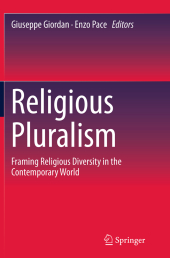 Neuerscheinungen 2016Stand: 2020-02-01 |
Schnellsuche
ISBN/Stichwort/Autor
|
Herderstraße 10
10625 Berlin
Tel.: 030 315 714 16
Fax 030 315 714 14
info@buchspektrum.de |

Giuseppe Giordan, Enzo Pace
(Beteiligte)
Religious Pluralism
Framing Religious Diversity in the Contemporary World
Herausgegeben von Giordan, Giuseppe; Pace, Enzo
Softcover reprint of the original 1st ed. 2014. 2016. x, 188 S. 14 SW-Abb., 13 Tabellen. 235 mm
Verlag/Jahr: SPRINGER, BERLIN; SPRINGER INTERNATIONAL PUBLISHING 2016
ISBN: 3-319-38187-3 (3319381873)
Neue ISBN: 978-3-319-38187-9 (9783319381879)
Preis und Lieferzeit: Bitte klicken
This volume illustrates both theoretically and empirically the differences between religious diversity and religious pluralism. It highlights how the factual situation of cultural and religious diversity may lead to individual, social and political choices of organized and recognized pluralism. In the process, both individual and collective identities are redefined, incessantly moving along the continuum that ranges from exclusion to inclusion.
The book starts by first detailing general issues related to religious pluralism. It makes the case for keeping the empirical, the normative, the regulatory and the interactive dimensions of religious pluralism analytically distinct while recognizing that, in practice, they often overlap. It also underlines the importance of seeking connections between religious pluralism and other pluralisms. Next, the book explores how religious diversity can operate to contribute to legal pluralism and examines the different types of church-state relations: eradication, monopoly, oligopoly and pluralism.
The second half of the book features case studies that provide a more specific look at the general issues, from ways to map and assess the religious diversity of a whole country to a comparison between Belgian-French views of religious and philosophical diversity, from religious pluralism in Italy to the shifting approach to ethnic and religious diversity in America, and from a sociological and historical perspective of religious plurality in Japan to an exploration of Brazilian religions, old and new.
The transition from religious diversity to religious pluralism is one of the most important challenges that will reshape the role of religion in contemporary society. This book provides readers with insights that will help them better understand and interpret this unprecedented transition.
Chapter 1: Introduction: Pluralism as Legitimization of Diversity; Giuseppe Giordan.- PART I: IDEAS AND CONCEPTS ON RELIGIOUS PLURALISM.- Chapter 2: Rethinking Religious Pluralism; James A. Beckford.- Chapter 3: Religious Diversity, Social Control, and Legal Pluralism: A Socio-Legal Analysis; James T. Richardson.- Chapter 4: Oligopoly Is Not Pluralism; Fenggang Yang.- PART II: CASE STUDIES IN RELIGIOUS PLURALISM.- Chapter 5 : Religious and Philosophical Diversity as a Challenge for the Secularism: A Belgian-French Comparison; Jean-Paul Willaime.- Chapter 6: The Diversity of Religious Diversity. Using Census and NCS Methodology in Order to Map and Assess the Religious Diversity of a Whole Country; Christophe Monnot and Jörg Stolz.- Chapter 7: Increasing Religious Diversity in a Society Monopolized by Catholicism; Vincenzo Pace.- Chapter 8: Rethinking Religious Diversity: Diversities and Governance of Diversities in "Post-Societies"; Sinisa Zrinscak.- Chapter 9: Diversity vs Pluralism? Notes from the American Experience; James V. Spickard.- Chapter 10: Between No Establishment and Free Exercise: The Dialectic of American Religious Pluralism; William H. Swatos, Jr.- Chapter 11: Missionary Trans-border Religions and Defensive Civil Society in Contemporary Japan: Toward a Comparative Institutional Approach to Religious Pluralism; Yoshihide Sakurai.- Chapter 12: Religious Tendencies in Brazil: Disenchantment, Secularization, and Sociologists; Roberto Motta.- Index.


